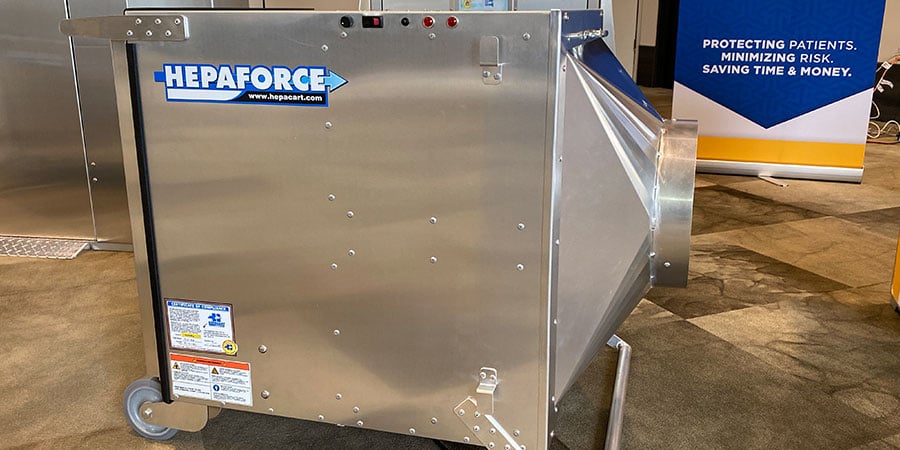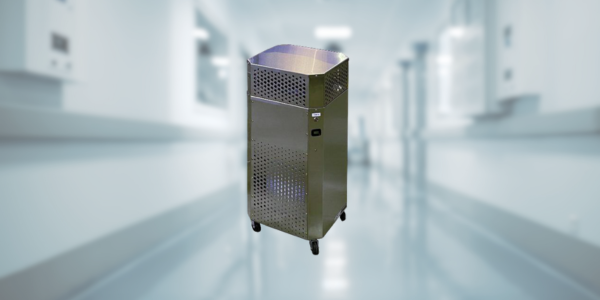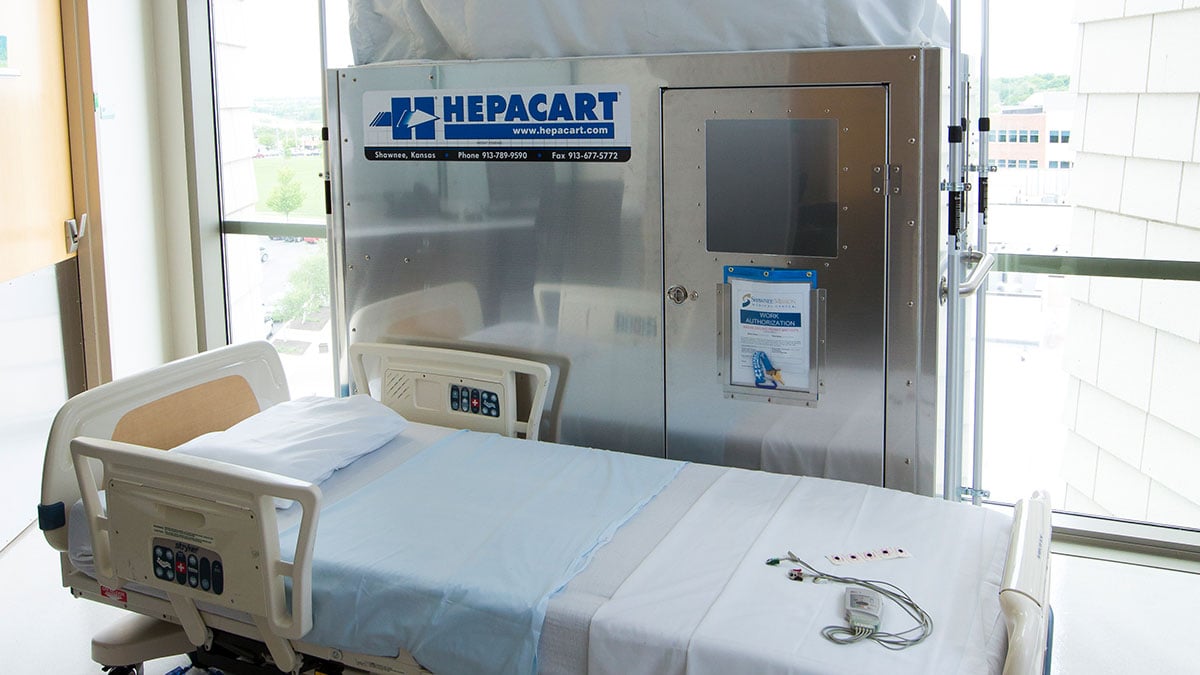Share this
Clean Air: The Effectiveness of HEPA Filtration Systems in Healthcare
by HEPACART on Feb 19, 2024

As a modern healthcare facility, pristine air quality is as much of a non-negotiable as having an operating room or doctors on staff. As a facility manager, you know how important selecting the right air filtration system can be and how much of an impact this decision has on not just your role but the health of the facility as a whole. It's not just about having a filter in place; it's a matter of selecting the right filter for the space and its particular demands. Different potentially harmful particles — from those contained in dust and debris to dangerous pathogens and bacteria — vary in size and the threat they pose. Depending on the area within your hospital, the patient risk, and many other factors, the right choice of filtration system may change.
For the gold standard in air filtration, you’ll find that the High-efficiency Particulate Air (HEPA) filters stand out from the rest. Known for their unparalleled ability to capture and eliminate a wide range of airborne pollutants, HEPA filters are critical in helping healthcare facilities achieve and maintain the highest standards of air cleanliness. In this comprehensive look, we’ll explore why HEPA filters are the preferred choice in healthcare settings and how they function to ensure air safety.
Decoding HEPA: How These Filters Transform Healthcare Air Quality
HEPA filters are more than just air filters; they are a critical component in maintaining a sterile environment. With their distinct pleated design, HEPA filters can trap at least 99.97% of airborne particles that are as small as a tiny 0.3 micrometers in size. This size is particularly important because many of the most dangerous disease-causing particles are around the .3 micron size mark. However, HEPA filters can also capture particles that are both larger and smaller than this threshold with even greater efficiency.
When it comes to different types, or grades, of HEPA filters, anything above an H10 is considered a HEPA filter. H10, H11, and H12 have lesser degrees of filtration, whereas H13 and H14 are on the medical-grade spectrum and provide more robust filtration. The highest performance seen in H13 or H14-graded filters can trap 99.95% and 99.995% (respectively) of those .3 micron particles.
No matter which level of HEPA filter you pick, it’s critical that you consistently replace them on an at least annual basis so that they are free of excess dust and debris. As long as you’re maintaining them appropriately, HEPA filtration systems will continue to provide pristine air quality for years to come.
Beyond the Buzzwords: Identifying Genuine HEPA Filtration
When shopping for HEPA filters, you might encounter misleading marketing terms like "HEPA-type," "HEPA-like," "HEPA-style," or "99% HEPA." These terms are often used to market products that do not meet the strict standards and requirements of true HEPA filters. Don’t be confused by these fake designations. In truth, a filter is either genuinely HEPA-certified or it isn’t. When it comes to your most sensitive healthcare settings, choose the real deal for your facility to provide the highest level of air filtration.
Anatomy of a HEPA Filter: What Makes It Work
The reason a HEPA filter of any grade is so effective is due to the structure and how it is able to stop potentially harmful airborne particles in their tracks. Made from a mat of randomly arranged fibers, these powerful filters are designed to target particles through three key mechanisms: interception, impaction, and diffusion. This approach ensures that even the most minuscule of particles are effectively captured, providing a comprehensive solution to air purification.
Impaction
Think of impaction as a sticky trap. Here, particles in the air directly collide with filter fibers. Many of these fibers feature adhesive coatings, ensuring that once particles make contact, they remain “stuck.”
Interception
Interception is a bit like a maze for airborne particles. As they venture into the filter, particles are tangled in the filter’s fibers. They simply can’t move past without being caught.
Diffusion
Diffusion is the best filtration solution for those tiny and erratically moving particles in the air. Their unpredictable movement causes them to frequently collide with filter fibers. Once they make contact with the filter, they're attached for good.
HEPA Filters: Beyond Just Air Purification
HEPA filters aren’t just meant to filter the air for the sake of dust control alone. They provide a whole host of benefits to your medical facility, ranging from their contribution to your overall infection control strategy to limiting allergens and keeping unpleasant odors at bay.
- Infection Control: Because they can remove airborne particles from your facility with such a high level of effectiveness, HEPA filters reduce the potential for the spread of disease. Dust particles can harbor dangerous viruses and bacteria. By locking them away, you have less to worry about when it comes to patients and staff potentially infecting one another through airborne particles.
- Allergen Reduction: HEPA filters significantly reduce the presence of allergens, which is crucial in healthcare environments where patients with allergies or respiratory issues may be present. This is critically important, especially for those who already have a lowered immune system due to an illness. For them, a potential allergy attack could be much more serious.
- Odor Elimination: Advanced HEPA filters can also help in reducing odors, which is particularly beneficial in maintaining a pleasant environment in patient care areas. While this isn’t explicitly required for a healthy environment, it does make a big difference in your patient’s experience when they may be having a hard time otherwise.
Choosing the Right HEPA System for Your Healthcare Facility
Understanding HEPA filtration and the importance of maintaining a clean and healthy level of indoor air quality (IAQ) for your facility is one thing, but it’s an entirely different thing to create your ideal lineup of equipment. Let’s explore a few of our best recommendations for HEPA filtration systems that may be a good fit for your facility.
HEPAFORCE® AIR Negative Air Machines and Scrubbers:
These are designed for a variety of settings, including light construction areas within medical facilities. By creating positive or negative air pressure, they prevent contaminated air from escaping the area and direct it through the HEPA filter for purification.
HEPAFORCE® GermBuster Room Air Purifiers:
When paired with UV-FORCE technology, these air purifiers are capable of processing the air in a room of 3,200 cubic feet up to six times per hour. Ideal for patient rooms and other critical areas, they ensure a consistently clean air environment.
HEPACART® Mobile Containment & Filtration:
The flagship HEPACART system, synonymous with our brand, combines effective dust containment with stringent safety protocols. Specifically designed for healthcare settings, it guarantees the health and safety of all individuals in the vicinity.
Advanced Applications and Future Trends in HEPA Filtration
As technology advances, HEPA filters continue to evolve. Future trends in HEPA filtration technology point towards even more efficient and adaptable systems including features like enhanced air quality control in complex healthcare environments, ensuring that these facilities can adapt to emerging challenges and maintain the highest standards of patient care and safety.
Elevating Healthcare Standards with HEPACART®
Your facility deserves the best in air filtration, no matter what kind of facility you’re in. Don’t take any chances with your IAQ — choose the HEPA-certified equipment that will create a safe and healthy environment for everyone inside. Whether you choose our HEPACART mobile dust containment car, HEPAFORCE AIR Negative Air Machines, HEPAFORCE GermBuster Room Air Purifiers, or any other of our HEPA-filtered systems, you can confidently purchase knowing that you are investing in the best of the best.
Discover how HEPA filtration can change the game in your facility’s air quality control and create a safer environment for patients and staff alike. Not sure where to begin? We can help. Reach out to our team of knowledgeable sales professionals to curate the perfect team of HEPA equipment to bring into your medical center today.




